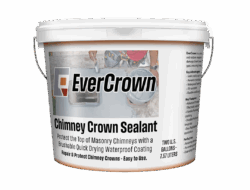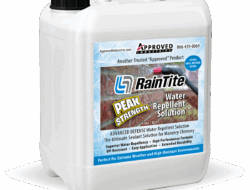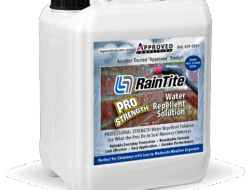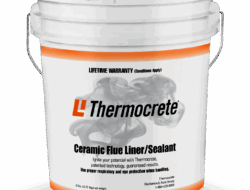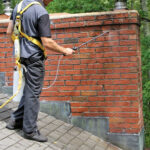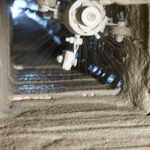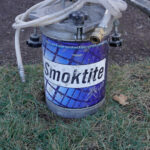Frequently Asked Thermocrete® Questions
Can any chimney professional use Thermocrete® Ceramic Flue Liner?
Thermocrete® Ceramic Flue Liner can only be installed by a factory-trained technician. All installers are required to attend a comprehensive Thermocrete® training program. Each applicant is thoroughly screened prior to being accepted into our training program. Companies seeking certification bring their team of experienced chimney professionals to our facility for three days of intensive training on specialized equipment. After successfully completing the training, they receive official certification, assuring you that they are an authorized Thermocrete® installer.
If you are interested in offering Thermocrete® to your customers, you can apply to be an installer here.
Can Thermocrete® repair a chimney-fire damaged tile liner? What are the limitations?
Yes, Thermocrete® does repair heat-damaged clay tile. It fills cracks, binds tile together, closes eroded tile joints, and provides a heat-diffusing barrier that renders the total liner better than it was when it was first installed. Tests show that a Thermocrete®-repaired broken tile liner is gas-tight, remains intact during normal (sub-1200F) use, and is 99% less likely to re-crack during elevated chimney-fire temperatures of 1200-2100F. Thermocrete® will fill normal masonry joints, but for fire-damaged tile repair, only liners with no more than 1/8″ cracks be candidates for Thermocrete®. If tiles are broken apart, loose, or missing, you can’t use Thermocrete®. If tiles have holes larger than 1 inch in them or gaping cracks, you must not use Thermocrete®.
What about the need to downsize for many gas and oil applications?
This is an occasion that would require a different type of liner than Thermocrete®. The advantage of Thermocrete® in most cases is that it does NOT substantially downsize the flue.
Is Thermocrete® a zero-clearance liner?
Thermocrete® is not tested as a zero clearance liner for solid fuel. Thermocrete® possesses minimal insulation qualities and instead works by dispersing heat in a unique way
How does installation of Thermocrete® work in cold weather?
The problems you may encounter in cold weather are primarily related to the application process, not the finished product. Whenever you are dealing with water in below-freezing conditions, there are precautionary measures that need to be taken, however, if done properly, Thermocrete® can be sprayed in weather as cold as 20 F.
One of the benefits of Thermocrete® is that a few minutes after the end of spraying, many heating appliances can be fired to complete the cure, with no worries about plummeting nighttime temperatures.
How will Thermocrete® stand up to brushing during chimney cleaning, especially with flat-wire brushes?
Thermocrete® stands up very well to normal chimney cleaning. No special care is needed during cleaning. Although Thermocrete® is 5 times harder than cast-in-place liners and it has a remarkable capability for bonding firmly to chimney walls, however we do not recommend the use of rotary chains.
What about creosote wicking through tile liner cracks and remaining a hazard on the backside of existing tile?
Actually, the quantity of creosote that works its way through small tile cracks is inconsequential. We have never seen a dangerous quantity of creosote on the backside of minimally cracked tile. With a liberal coating of Thermocrete® in place, hot gases cannot penetrate the repaired tile to reach any creosote film. Thermocrete® provides a heat-diffusing barrier to minimize temperature rise on the back side.
How about eroded and spalled tile liners serving oil and gas appliances?
Thermocrete® is excellent in this situation. Since Thermocrete® is only as good as the substrate it is applied to, you should brush and peel away all loose liner materials first. The liner should generally remain, at minimum; 3/8″ thick at most spots. Any holes should be backed closely by masonry walls or filled with refractory materials. The Thermocrete® coating will then strengthen and bind together the old surface with a new acid-resistant and moisture-resistant seal.
Has Thermocrete® passed any official tests or certifications? What about U.L.?
Yes. Thermocrete® has undergone extensive testing by Ceram Research and Warnock Hersey / Intertek Testing Services. It was originally listed to the applicable sections of UL 1777 by Warnock Hersey in 1999 (#J99001572-231) then reevaluated, listed and labeled by Guardian Fire Testing Laboratories in 2011 to UL 1777 and ULC S 635 as a liner for Gas and Oil(GL90811/FI19311). Thermocrete® is also in compliance with NYS Building Code MC 801.16, item 3 and FGC 501.12, item 3. See the Thermocrete® technical data sheet for more information.


